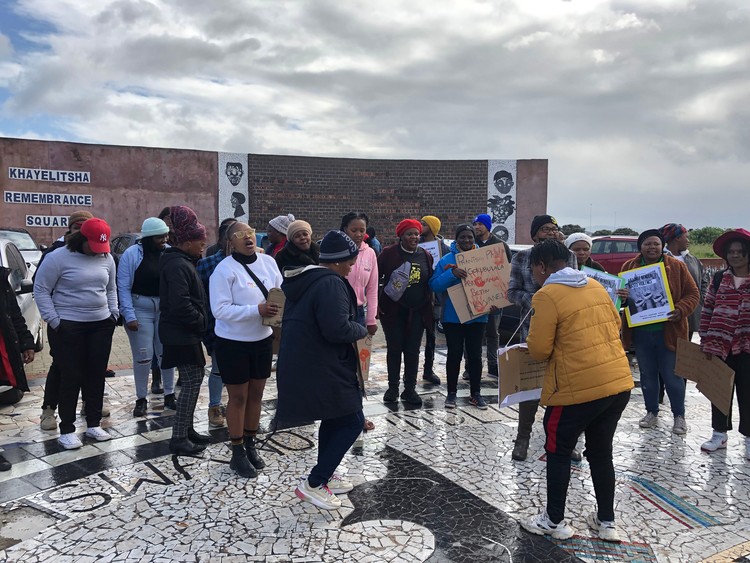
31 January 2023
Members of Free Gender protested at Khayelitsha Remembrance Square outside the magistrate’s court in September. Archive photo: Mary-Anne Gontsana
The man accused of fatally stabbing a Khayelitsha woman has been found not guilty by the Khayelitsha Magistrates Court. This news came as a shock to her family and activists who for months had been fighting for justice for Phelokazi Mqathanya’s murder.
Mqathanya, who lived in Site C in Khayelitsha, was stabbed to death on 2 May 2021. She was lesbian and her relatives and activists believe her murder was a hate crime.
The accused, Bongani Ngadleka, was arrested soon after the murder. But after several delays in the investigations and four court postponements, the case was removed from the court roll on 14 December 2021. The case was brought back to court on 5 May 2022 following action by activists at Free Gender.
In October 2022, the case was again postponed because the prosecutors were not in court and the matter was remanded for trial in January 2023 at a hearing later that month. The trial was expected to start on 18 January, but the accused was not at court due to “transport issues” at Pollsmoor Prison. This happened again on 19 January. This case has been postponed 15 times since May 2022.
On Friday 27 January, Ngadleka was found not guilty on the charge of murder. The magistrate found the case had failed to present sufficient evicence.
On Thursday 26 January, state witness Abongile Ngalo told the court that the night Mqathanya was stabbed, he and his friends were drinking at his house when she joined them with three other girls. “Phelokazi was my friend,” he said.
Ngalo said that the accused had arrived about 20 minutes after Mqathanya and her friends, who had been sitting in the kitchen area of the house.
“Bongani wasn’t a friend, but I knew him from [the community]. He started dancing but we never paid much attention to him. At one point I saw him going to the kitchen but from where I was sitting, I didn’t see if he had spoken to Phelokazi and her friends. While he was in the kitchen I didn’t hear any commotion or arguments. After about 10 minutes I saw him leave the house,” he said.
Ngalo said Mqathanya had gone outside, apparently to get a lighter for her cigarettes. About 20 minutes later he went out to buy more alcohol and that’s when he saw her lifeless body lying outside on the corner of his home.
Ngalo testified that he did not see Ngadleka or anyone else at the scene.
Ngadleka’s legal aid lawyer argued that the State’s witness did not place his client at the crime scene nor did he see any communication happen between his client and the deceased.
The lawyer said it was “unfortunate” and “unfair” for Ngadleka to be behind bars when there was no evidence proving that he had committed the crime.
It was revealed in court that the state was meant to call a second witness to testify, but had not been able to find her. “The investigating officer has on numerous occasions visited the second witness’s home but she was not there. The investigating officer was later told by the witness’s mother that she is working on a farm in Malmesbury but her mother didn’t know which farm,” the prosecutor told the court. It was alleged that this was the witness who had seen the accused leaving the crime scene.
The magistrate ruled that the State had failed to produce tangible evidence that Ngadleka had killed Mqathanya. “There is absolutely no evidence linking the accused to the offence,” said the magistrate.
After the verdict, Free Gender’s Funeka Soldaat said, “This case was handled badly from the beginning which is why we are in this situation. Even at the last minute, we were the ones who had to go look for witnesses for this case. It is a very painful thing.”
Phumeza Ndlwana, Mqathanya’s sister, said, “As a family we are not at peace. But then again that’s how the South African justice system is. We will never be at peace.”
“I blame the police because they handled this case badly from the start. For instance, when we went to identify my sister’s body, we were given her bloody clothes in a plastic bag and told to take them to the investigating officer at the police station. Weren’t they meant to retrieve the clothes as evidence?”
“We went to the police station numerous times before going to the Eastern Cape for Phelokazi’s funeral and each time we’d go we would be told that the investigating officer is not there,” said Ndlwana.